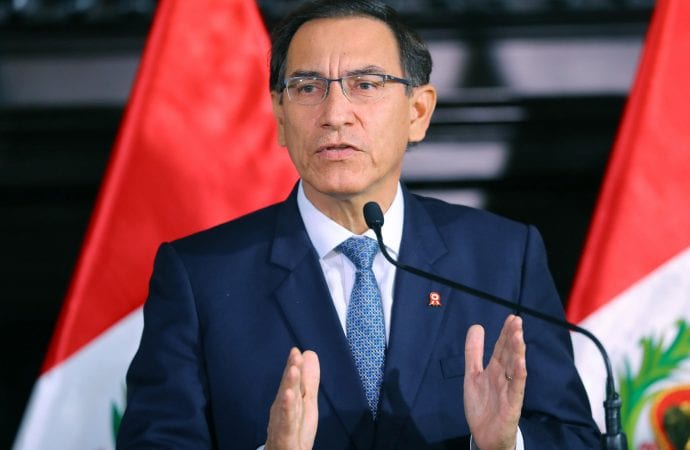Given a history of corruption at the highest levels, with three former presidents under investigation and another who committed suicide, political woes are nothing new in Peru. Yet after a remarkable congressional meltdown this week, the country’s bishops have urged citizens to avoid escalation and to double down on anti-corruption efforts.
Peruvian President Martín Vizcarra dissolved congress Monday after months of deadlock, throwing the country into crisis as congress then moved to suspend the president, and the vice president quit. At the moment, it’s a bit difficult to answer the basic question, “Who’s in charge?”
In an Oct. 1 statement, Archbishop Héctor Miguel Cabrejos of Trujillo, president of the Peruvian bishops’ conference and president of the Bishops’ Conference of Latin America (CELAM), said the current political situation “should lead us to a deep reflection, giving concrete and responsible answers, and avoiding falling into revenge and/or complicity.”
As tensions mount, Cabrejos said, the crisis should be seen as an opportunity “to fight the cycle of corruption great and small, at all levels.”
Cabrejos issued the statement from Rome, where he’s on hand to participate in the Oct. 6-27 Synod of Bishops on the Amazon.
Peru has a decades-long history of corruption and political chaos. Among the most famed scandals is the Odebrecht fiasco, which resulted in the ousting of many of those who led Peru after the 1990-2000 authoritarian rule of President Alberto Fujimori, currently in prison on charges of both corruption and human rights abuses. His daughter Keiko - also a politician - was arrested in 2016.
In 2016, the Odebrecht company admitted in a plea bargain with the U.S. Department of Justice that it had paid some $800 million in bribes in 12 Latin American countries.
Other former presidents under investigation are: Pedro Pablo Kuczynski, accused of corruption in the Odebrecht case; Ollanta Humala, accused of accepting some $3 million from Odebrecht in illegal financing of an electoral campaign; Alan Garcia, who committed suicide in April as police came to arrest him on corruption charges also linked to Odebrecht; and Alejandro Toledo, who is currently behind bars in the U.S. and who is accused of accepting some $20 million in bribes from Odebrecht.
Dominated by the opposition Popular Force party, led by Keiko Fujimori, Peru’s congress has thwarted Vizcarra’s efforts to pass his anti-corruption legislation, prompting Vizcarra to invoke an article in the Peruvian constitution allowing the president to dissolve congress if it had twice voted ‘no’ in a ‘vote of confidence.’
Many Peruvians are divided on whether all the standards of invoking the article were met. In an act of defiance on the part of those angered by the dissolution, Mercedes Aráoz, the country’s vice president, was sworn in as an interim leader by opposition lawmakers who argued the move was unlawful.
They also ruled to suspend Vizcarra for a year, however, since the decision was made after congress’s dissolution, the government argued that the decision was null and void, and just hours after her swearing in, Aráoz resigned.
Current tensions are expected to continue for several days. Congress is tentatively planning to meet next Friday to vote on a motion to dismiss Vizcarra altogether, yet in the meantime, Vizcarra has issued a decree establishing fresh parliamentary elections on Jan. 26. Those elected would serve out the 5-year period of the dissolved congress, set to end in 2021.
The chaos falls just six weeks after Peruvian bishops launched a university course to educate students on the causes of corruption, and how to stop it.
In his statement, Cabrejos insisted that people maintain their desire to change deeply-rooted problems and to improve the country, “both morally and in respect of the common good.”
“We must not only think of social and political groups,” he said, “but of more than 33 million Peruvians, especially our children and young people, who are the future of Peru.”
He urged Peruvian leaders and society as a whole to “act according to constitutional and democratic order.”
While opinions differ on what specific political actors can or can’t do, “we call on each of them to consider at the same time the claim of their attributions with respect to their adversary, since they will remain a political actor, avoiding every kind of violence, wherever it comes from,” Cabrejos said.
He insisted that a “stable policy” be developed as soon as possible which is able to hold until the next election cycle, insisting that “this political stability will define the next representation of the country.”
Cabrejos called for a day of prayer for peace and the integral human development of the country, “with the assurance that together we will make our Peru great.”

